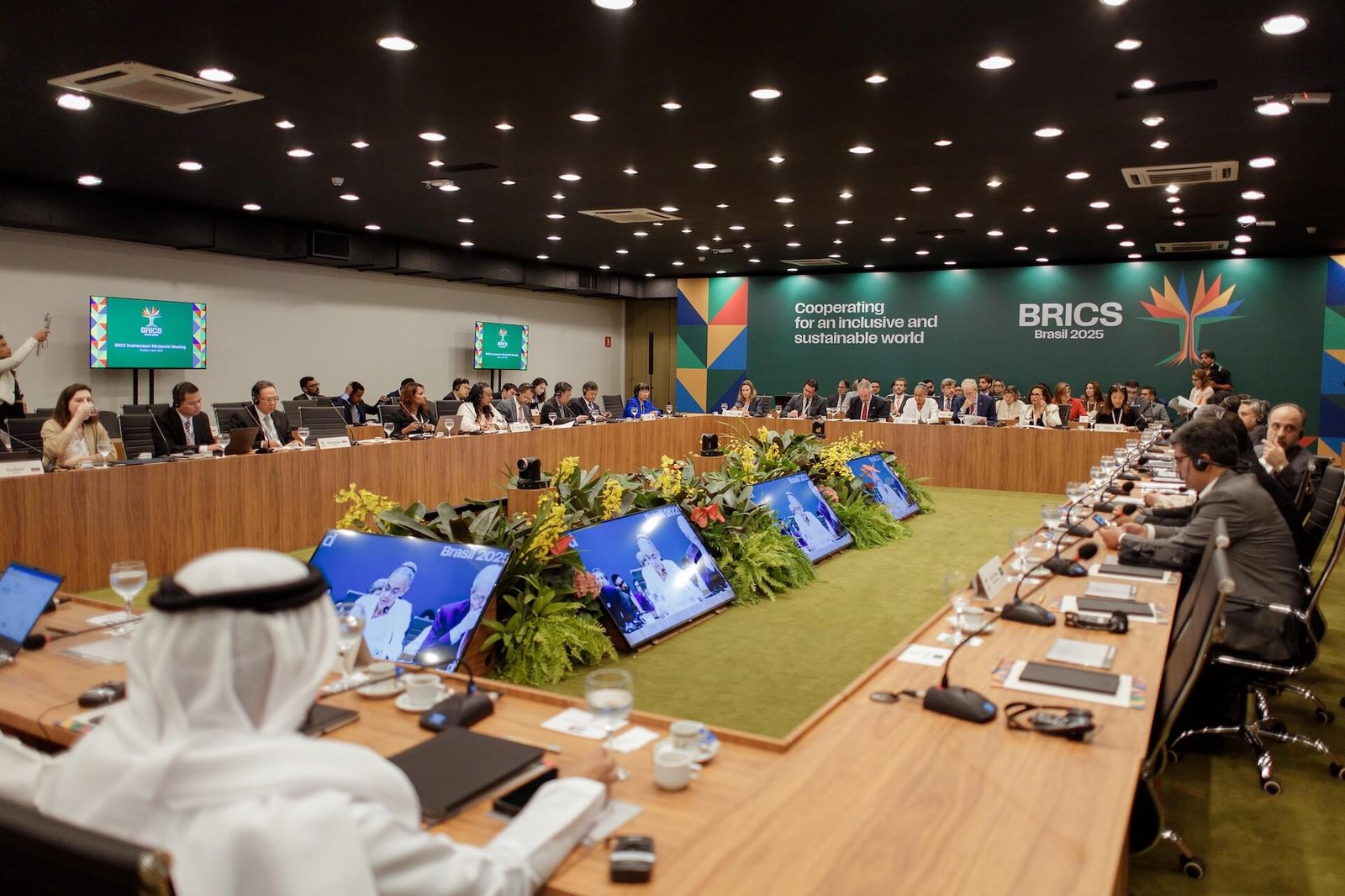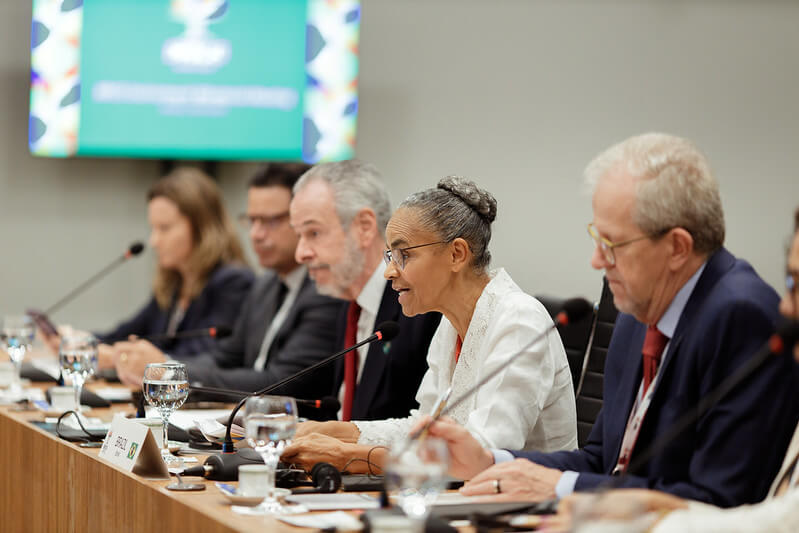Ministers approve BRICS Environment declaration
BRICS ministers met at the Itamaraty Palace to complete the text which will be presented to heads of State at the Summit in July. Brasil's Minister of the Environment and Climate Change Marina Silva highlighted that Global South countries are “essential to the balance of the planet.”

By Mayara Souto | mayara.souto@presidencia.gov.br
BRICS Environment ministers approved a ministerial declaration on Thursday, April 3, at a high-level meeting in Brasilia. In the letter, the countries reiterate the importance of “environmental multilateralism” and “balanced and inclusive global governance” to achieve common goals to protect the environment. “We recognize the urgent need to address global and regional environmental challenges in a collaborative and science-based way,” reads an excerpt from the text.
In her opening speech, Brasil’s Environment Minister Marina Silva highlighted the importance of the Global South to multilateralism and international cooperation.
“In the coming decades, the strength of our [BRICS] economies will make us even more influential. Today, we represent about half of the world’s population and 39% of the global GDP [Gross Domestic Product]. More than ever, BRICS is an increasingly fertile space for innovation, rich in cultural diversity, with strategic resources, and an immense quantity and quality of natural capital,” said the minister.
“Our countries are providers of services and ecosystems that are essential to the planet’s balance. They are also essential support to nature-based solutions that are in tune with the Earth’s capacity to assimilate. We are in a good position to lead a fair ecological transition that strengthens a more cooperative and less unequal multipolar world,” continued Marina Silva, who also welcomed the group’s new member countries: Egypt, Ethiopia, Indonesia, Iran, Saudi Arabia, and the United Arab Emirates.
Global warming
The ministerial declaration on the Environment includes the seven proposals that resulted from discussions regarding the four priority axes presented by the Brazilian presidency — desertification, land degradation, and drought; preservation, restoration, and enhancement of ecosystem services; plastic pollution and waste management; and collective leadership for climate action, in synergy with the United Nations 2030 Agenda for Sustainable Development.
The group highlights the impacts of climate change, and the “need to accelerate mitigation and adaptation actions” through the transition of economies to low carbon. The Paris Agreement is recognized in the declaration as an important commitment to the establishment of Nationally Determined Contributions (NDCs) — which seek to reduce greenhouse gas emissions to limit global warming to 1.5ºC.

“The rise of unilateralism and extremism is jeopardizing global stability and deepening injustices, affecting the most vulnerable populations in particular. This instability is further aggravated in the context of the climate emergency in which we are living. We have broken successive temperature records. Last year was the hottest in history, surpassing the critical limit of 1.5ºC for the first time. In this context, President Luiz Inácio Lula da Silva has reiterated the strategic role of BRICS as a space for dialogue and collective construction of solutions"
Minister Marina Silva highlighted that BRICS is essential to maintaining this goal, especially in the current international context. “The rise of unilateralism and extremism is jeopardizing global stability and deepening injustices, affecting the most vulnerable populations in particular. This instability is further aggravated in the context of the climate emergency in which we are living. We have broken successive temperature records. Last year was the hottest in history, surpassing the critical limit of 1.5ºC for the first time. In this context, President Luiz Inácio Lula da Silva has reiterated the strategic role of BRICS as a space for dialogue and collective construction of solutions,” she declared.
Nevertheless, the BRICS WG also draws attention to the “national capacities and circumstances” of the group’s countries to combat climate change. The text encourages technology transfer and “adequate climate finance for developing countries,” which is the main challenge of COP30 (the United Nations Climate Conference), also under Brazilian presidency and to be held in November in Belém, Pará.
“BRICS represents almost 50% of the world’s population and almost 40% of the world’s GDP. Therefore, it is an absolutely important group from both a geopolitical and economic standpoint. And, naturally, when we talk about economics, it has everything to do with the issue of climate change — because solutions to climate change are naturally connected to changes in countries’ economies,” said Ambassador and president of COP30 André Corrêa do Lago, who was also present at the event.
The president of COP30 also highlighted the Brazilian presidency at COP for a new type of climate fund. “Financing has been a challenge since the beginning of the Climate Convention negotiations — and it is an extremely difficult and controversial issue. The fund that Brasil is proposing — the Tropical Forests Forever Facility (TFFF) — is especially innovative. There are different ways to finance forests for each type of activity. There was no formal mechanism designed specifically for forest conservation, and the TFFF addresses exactly that. It seeks to solve a problem that has not yet been solved,” he said.
Technical cooperation
Technical cooperation was highlighted as essential for the BRICS countries to advance in sustainable development. Strategic partnerships and the sharing of initiatives and technologies are being planned towards the group's objectives. In this sense, the ministers established investment in “research and innovation for the development of green technologies and sustainable solutions.” There is also a provision for the creation of platforms to facilitate the exchange of information and experiences on the subject.
The conservation of biodiversity and the sustainable use of countries' natural resources were also presented as a BRICS commitment to “combating the degradation of terrestrial and marine ecosystems.” Moreover, the group urged for the implementation of the Kunming-Montreal Global Biodiversity Framework — signed at the 15th Conference of the Parties to the UN Convention on Biological Diversity in Montreal, Canada, in 2022. The agreement establishes targets to reverse biodiversity loss by 2050.
Circular economy and integrated waste management were also included in the declaration as a way to reduce plastic and promote recycling. “We reiterate our commitment to eliminating environmental pollutants and developing sustainable value chains,” the document states.
Finally, the BRICS Environment ministers pledge to increase environmental education and raise public awareness regarding environmental responsibility through campaigns, educational programs, and community projects.
According to the text, the initiatives that were jointly signed by BRICS countries will be monitored regularly. “We conclude this Declaration by reaffirming our determination to work together towards a sustainable and prosperous future for all BRICS countries and for the world,” the document concludes.
Marina Silva added that, in addition to the ministerial declaration, the representatives of the 11 member countries also approved a work plan that includes a memorandum of understanding on environmental cooperation for the 2024-2027 period. The document provides for around 50 practical activities in strategic fields such as air quality, environmental education, biodiversity, waste and chemical management, water resources, coastal and marine areas, and climate change.